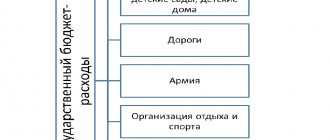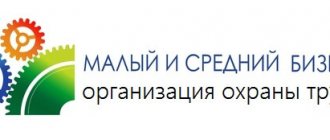What are local regulations, who needs them and why?
The concept of what local regulatory acts of an organization (LNA) are is given in Art. 8 Labor Code of the Russian Federation. These are documents accepted by the employer, containing labor law norms, rules for their implementation and regulation of labor relations within the enterprise. The main requirement for the LDF is not to worsen the situation of workers, as established by law. Signs of a local regulatory act:
- determines the implementation of federal laws in a specific organization;
- acts between the employees and the employer of the company;
- applies to all employees;
- not designed for one-time use - used periodically;
- improves the position of employees and expands the basic level of protection compared to current standards;
- is adopted taking into account the opinion of the representative bodies of workers.
Well-designed local acts help resolve controversial situations.
Recommendations from ConsultantPlus (free access)
Guide to HR issues. The procedure for developing and approving local regulations of the organization
Local regulations of the organization list for LLC or individual entrepreneur
There is no strict list of company standards that entities must have. Let's look at their types and for whom they are mandatory:
| Name of LNA | Mandatory | Note |
| Inner order rules | Required | Mandatory for the organization if there is a reference to them in employment contracts. Individual entrepreneurs are formed at will. |
| A standard that defines the basic concepts and measures to protect personal data of company employees. | Required | Formed by all employers as operators for working with PD. This is a mandatory standard for organizations; individual entrepreneurs can be formed at will. |
| Occupational Safety and Health Regulations | Required | Compiled by all entities that have employees. This is a mandatory standard for organizations; individual entrepreneurs can be formed at will. |
| Staffing table | Required | If there is at least one employee, the staffing table must be formed. The Labor Code of the Russian Federation requires mandatory compliance between it and the executed employment contract. This is a mandatory standard for organizations; individual entrepreneurs can be formed at will. |
| Collective agreement | Required | It is obligatory for the organization if at least one of the company’s employees expresses a desire to enter into it. This is a mandatory standard for organizations; individual entrepreneurs can be formed at will. |
| Remuneration Regulations | Required | Mandatory if the employee’s employment contract contains a reference to it. This is a mandatory standard for organizations; individual entrepreneurs can be formed at will. |
| Vacation schedule in the organization | Required | If the company has at least one employee. This is a mandatory standard for organizations; individual entrepreneurs can be formed at will. |
| Job descriptions of employees at the enterprise | Required | If the company has at least one employee. This is a mandatory standard for organizations; individual entrepreneurs can be formed at will. |
| Regulations defining ethical behavior in an organization | Necessarily | This is a mandatory standard for organizations; individual entrepreneurs can be formed at will. |
| Anti-corruption regulations in the company | Necessarily | This is a mandatory standard for organizations; individual entrepreneurs can be formed at will. |
| Regulations on trade secrets | Not necessary | Organizations and individual entrepreneurs form it at will. |
| Regulations on business trips | Not necessary | Organizations and individual entrepreneurs form it at will. It is often developed in companies where there is frequent business travel. . |
| Certification Regulations | Not necessary | Organizations and individual entrepreneurs form it at will. |
| Regulations on the structural divisions of the company. | Not necessary | Organizations and individual entrepreneurs form it at will. It is often developed in large companies. |
| Regulations on bonuses for company employees. | Not necessary | Organizations and individual entrepreneurs form it at will. |
| Regulations on medical examinations of enterprise employees | Not necessary | |
| Regulations on establishing a probationary period for employees | Not necessary | |
| Regulatory act on material and disciplinary liability of employees | Not necessary | |
| Regulatory act for organizing training and advanced training of employees | Not necessary | |
| Regulations on employee adaptation | Not necessary | |
| Regulation on voluntary health insurance | Not necessary | |
| Regulations on the issuance of financial assistance | Not necessary | |
| Company personnel standards. | Not necessary |
Attention: this list is not a closed list of regulations that can be formed in the company. It may also include other local regulations.
What regulatory documents are being developed in LLCs and individual entrepreneurs?
There is no legally approved list of local acts. The Labor Code mentions certain LNAs and considers them mandatory:
- internal labor regulations - Art. 189 – 190 Labor Code of the Russian Federation;
- on wages and bonuses - Art. 135 Labor Code of the Russian Federation;
- vacation schedule - Art. 123 Labor Code of the Russian Federation, letter of Rostrud No. 4414-6;
- establishing the procedure for processing personal data Art. 86, paragraph 8, art. 87 Labor Code of the Russian Federation;
- shift schedules, if they are not an appendix to the collective agreement - Art. 103 Labor Code of the Russian Federation;
- staffing table - Rostrud letter No. PG/4653-6-1.
What other local acts are mentioned in the Labor Code:
- rules and instructions on labor protection - Art. 212 Labor Code of the Russian Federation;
- on labor standardization - Art. 159 Labor Code of the Russian Federation;
- certification procedure - art. 81 Labor Code of the Russian Federation.
IMPORTANT!
Local regulations state when there is a need to resolve a situation that has arisen as a result of the company’s activities. Such LNAs are not mandatory - they are developed at will, if the situation is typical for the specific activities of an LLC or individual entrepreneur.
How to adopt a local act
The Labor Code contains only the most general provisions concerning the procedure for the adoption of local regulations. So, according to Art. According to the Labor Code of the Russian Federation, if the organization has a trade union, then in cases directly specified in the Labor Code of the Russian Federation, when adopting a local act, the employer is obliged to request the opinion of the trade union. For example, such an obligation arises when approving the Internal Labor Regulations (Article 190 of the Labor Code of the Russian Federation), the Regulations on Remuneration (Article 135 of the Labor Code of the Russian Federation), and the Rules for Compensation of Expenses for workers employed in the Far North (Article 325 of the Labor Code of the Russian Federation).
In other cases (or in all cases, if the organization is not burdened with a trade union), local acts are adopted by the employer independently. As for the form, in practice local acts are most often adopted in the form of various provisions, procedures, and instructions. The procedure for preparing and approving the text of a document within an organization can be any, but the finished document must be approved either directly by the head of the organization or by another person authorized by him. Approval can occur either as a separate administrative document - an order or decree approving a local act, or in the form of the corresponding requisite “I approve” or “Approved” on the local act itself. Labor legislation does not contain any restrictions related to this issue.
We will talk separately about the procedure for the entry into force of local acts and how to correctly make changes to them and cancel norms that have become unnecessary.
Specialized LNA
In addition to the general ones, there is a list of mandatory LNAs applicable to industries. For example, the system of assessment activities in educational institutions. Its mandatory nature is determined by the law on education in the Russian Federation. Each educational institution independently develops its parameters, guided by the list of local acts that regulate VSOKO:
- No. 273-FZ;
- federal program “Development of Education for 2016-2020”;
- Order of the Ministry of Education and Science No. 462 dated June 14, 2013;
- Order of the Ministry of Education and Science of the Russian Federation No. 1324 dated December 10, 2013.
Certain types of local regulatory documentation are used in quality management systems. An approximate list of quality documents is the following documents:
- information about the QMS;
- requirements and specifications;
- methodological developments, recommendations;
- standards, instructions;
- objective data about tests and results.
Types of internal documentation
In labor law there are many classifications of documents. For business entities not included in the Federal Tax Service register, local regulatory labor acts are divided into mandatory and optional.
Types of local regulations, the introduction of which into document flow is necessary on the basis of the Labor Code, orders of ministries and departments:
- rules of procedure at the enterprise;
- staffing schedule;
- work record book;
- regulations on personal information of employees;
- instructions for occupations involving heavy work on labor protection;
- log of familiarization with local regulations introduced at the enterprise;
- fire safety documentation;
- regulations on vacations, vacation schedules for each calendar year;
- instructions for teaching staff working in an educational organization (school, preschool educational institution).
Local regulations of individual entrepreneurs and other enterprises in the field of personnel management, necessary under certain conditions:
- job descriptions (except for teachers) - if the responsibilities of staff are not regulated in employment agreements;
- regulations on the certification of teachers - according to orders of the Ministry of Education or as a result of a decision at the pedagogical council;
- local regulations on labor protection - by decision of the administration;
- charter - required for organizations with several co-founders;
- documents regulating payment for work - if the information is not included in the employment agreements;
- instructions for office work (rules, regulations regulating the work of the secretary and office) - by decision of the management;
- medical examination log - for organizations where minors are employed and for certain categories of personnel (for example, cooks);
- collective agreement - adopted at the initiative of one of the parties to the agreement;
- provisions on flexible working hours or shifts - if applied at the enterprise;
- provision on trade secrets - if agreements with personnel stipulate the obligation to maintain production secrets.
Local regulations include all documents adopted by the enterprise for general use. Orders of an individual nature, for example, on driver training, are not normative.
On video: Local regulations of the organization
How to properly develop, approve, agree
- Who develops it? The specialists responsible for the development of LNA are identified and approved by the manager.
- Development. It is written from scratch or a standard document is taken as a basis, into which the necessary adjustments are made to suit the specifics of a particular organization.
- Coordination. The project is coordinated with specialized departments and lawyers. If required by a collective agreement, with a trade union. Certain documents require mandatory approval from employees - for example, a vacation schedule. During the approval process, changes and adjustments are made to the project.
- Statement. The agreed document is submitted to the manager for signature.
- Familiarization. The approved LNA is handed over to employees for reading. The method of indicating the number and list of employees in local regulations for review and signature is chosen by the developers themselves. If there are few employees, an introductory sheet is attached at the end of the document; if the organization is large, a separate journal is drawn up. All employees are familiarized with documents of a general nature; if the LNA is of a specialized nature, those who are directly related to the activities regulated in the document.
Familiarization with the act of the organization's employees
After approval of a local regulatory act, it goes through the stage of registration in a special journal and receives an individual number and an indication of the date from which it comes into force.
Management is obliged to familiarize those of its employees whose activities are affected by this document itself with this act, in accordance with Article 22 (Part 2) of the Labor Code of the Russian Federation. The familiarization process is reflected on special familiarization sheets in the form of a separate appendix to the local regulatory act, and is also reflected in the familiarization log.
Is it necessary to familiarize employees with documents?
Not all LNA require mandatory familiarization. says that it is necessary to familiarize workers with those regulatory documents that are directly related to work activities. For example, a business trip clause is not signed by a person who does not travel anywhere.
Rostrud’s letter No. PG/4653-6-1 states that the staffing table relates to LNA, but is not directly related to activities. Thus, it is not necessary for employees to be familiar with it.
IMPORTANT!
Some features of familiarization with the regulatory documents of the enterprise are established in the collective agreement or other legal regulations.
The act has been passed - what next?
Since the act is mandatory for execution by employees, they should be familiarized with it. In accordance with Article 22 of the Labor Code of the Russian Federation, personal information related to the employee’s work activity must be brought to his attention against signature . This usually happens at the hiring stage. But it happens that the act is adopted already in the midst of labor relations. An employee needs to be familiarized with its contents if:
- the new act concerns this employee;
- working conditions change, which entails the need for additional regulation.
How to familiarize an employee with the act? The legislation does not cover this issue. The employer can choose the method of familiarization at its discretion. For example, send a local act to each employee or create a special journal where employees will have to sign.
many unresolved issues in labor legislation that relate to local regulations. However, their compilation must be approached very carefully. On the one hand, this will minimize disputes with employees, and on the other, it will protect the employer from claims from inspection bodies.
Responsibility for absence
The responsibility for developing LND lies with both the LLC and the individual entrepreneur. Liability for lack of documentation is regulated by clause 1 of Art. 5.27 of the Code of Administrative Offenses of the Russian Federation - violation of legislation and other regulations that contain labor law norms. If an enterprise does not have a provision on the protection of personal data, liability may arise, including criminal liability.
There is a category of employers exempt from LNA: individuals and owners of micro-enterprises. The latter include the conditions that are prescribed in the LNA in the text of the employment contract. They enter into standard agreements, the form of which is approved by the government.
Who should adopt internal acts and when?
The relationship between employer and employees is regulated by labor law. The Labor Code of the Russian Federation specifies many aspects of these relations, but not all of them are strictly regulated. Some issues are resolved by the employer independently or by agreement with the employee. It is precisely in order to consolidate such moments within the company and make them mandatory for execution that local regulations are adopted.
An example is the work schedule. In particular, Article 91 of the Labor Code of the Russian Federation states that the standard working time is 40 hours per week . At the same time, the norms of the Code do not regulate what time the working day should begin and how long the working day can be. It is understood that these points will be enshrined in local acts.
Internal regulations are adopted by all employers. There are no concessions in this sense for individual entrepreneurs - they, just like organizations, have labor relations with hired personnel. However, it is possible not to draw up LNA for micro-companies where no more than 15 people work and the annual income does not exceed 120 million rubles. In this case, all mandatory provisions must be specified in the employment contract. Also, local acts are not drawn up by individuals who are not registered as individual entrepreneurs, but attract hired workers.











